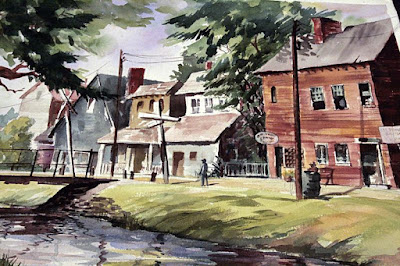Rui Zink, Novelist and Lterature Professor (UNova, Lisbon) about Hammett and Crime Fiction
A U.S. reaction to the British murder mysteries (prodigal in the
subgenre of "closet mystery") was the American hard-boiled school of
crime writing (certain
works in the field are also referred to as noir fiction). Writers like
Dashiell
Hammett (1894–1961), Raymond Chandler (1888–1959), Jonathan Latimer
(1906–1983), Mickey Spillane (1918–2006), and many others decided on an
altogether different, innovative approach to crime fiction. The
protagonist is an investigator that does not really have lawful
legitimacy (the private eye), tough and morose, involved with the
sleazy / urban side of life in the U.S.A. Below is the text Precisão e Bom Senso written by Rui Zink, who was a guest in this class in 2013 to discuss crime fiction
Precision. Precision and a
realism more real than real than reality — et
voilá what the American detective novel taught me. No sugar-coating,
no spurious feelings - I hope that this will have brought in at this
moment some students to the dictionary to see what "feelings" mean.
The American detective novel is not a uniform being ; however, in my
imagined memory as a reader (and reading is only fun when it becomes an
imagined memory), there is within it a heavy sound that is distinguishable from
what was there before and what will be there after, or from what was done in
other parts. The concrete jungle was invented with the Hammettian hardboiled
whose protagonist is the only being on the face of the Earth more cynical than
a wooden spoon. [1] The private detective isn't really the one who calls the
shots. He isn't particularly intelligent and certainly not very noble.
He is the type of guy who does a job, often a dirty job, solely because someone has to do it. Even in
Chandler, who romanticizes and inflates the detective type with a more literary
vigueur, the detective is a salaried
worker, a mercenary for hire, a hero on sale. When he meets his client he names
his price, something like "50 dollars per day plus expenses." And
then it starts: this unlikely Lancelot on a wooden horse goes looking for the
missing damsel in distress, sometimes a fickle rich widow, others an estranged
spouse, but mostly a femme fatale.
Indeed, the American
detective novel is at times misogynistic—excuse me, is there a problem? Women
are not to be trusted — and, for the record, neither are men. The detective,
however, has a strong work ethic. If you pay him, he is up for anything, even
descending to the depths of hell (usually they are close by, on the ground
floor), taking beatings, and gunshots, and being manipulated puppeted,
because a contract is meant to be honored, even when it it may cost us our
lives and we suspect that our client hasn't told us the entire story and might
actually be the bad guy. The city is a concrete jungle. If we do away with the
chrome exterior we discover that everyone has sordid secrets-except those that
don't have sordid secrets because they are sordid themselves and dangerous on
the very surface. The private eye is a solitary horseman who has the law
against him just as much as the world of crime. He makes everyone
uncomfortable, from any direction may come a gunshot or a dagger. He
isn't very well paid either, in this he reminds us our Portuguese teachers and
writers. Only those "50 dollars plus expenses." For what reason,
then, would he risk his life? Spenser [2], perhaps the most legitimate heir to
Marlowe and Chandler, gives the best and most succinct explanation:
"because that's what I do." The detective does what he has to do
because that is what he does, that is what he is good at. The detective isn't a
force for morality, thank God. He doesn't fight corruption, he just uncovers
it. And (alright, buster) sooner or later he does "the right thing."
But not because he wants to, just because, sometimes, luckily not often, the right thing is the right thing to do.
With Dashiell Hammet and
Rayond Chandler, the American detective novel gained style and complexity. Even
still it never softened, the American detective isn't a crybaby. Is he
sentimental? Yes, if his salary allows it. Even if the detective wanted to stop
to smell the roses, there aren't any around him. It is a world without the
metaphysical.
America, ah, America. There
isn't a place where pragmatic, down-to-earth America is more pragmatic, down-to-earth,
brutal, ironic, pure and tough than in the detective genre. We could rather say
in the "hardboiled detective
fiction" or in the "noir novel,"
but there is no reason to be redundant, is there? America is like Pessoa’s
character, Esteves from Tabacaria [3], metaphysics are out of the question. It
is a tough place, and it isn't for crybabies. For this reason it is of the
utmost importance that the words be precise, exact, fired intentionally, so
that they hit the target, without sugar coating, without fancy trimmings,
without European elegance—or any other kind, for the matter. There are no good
manners in American crime novels. There are just bad manners. Because: bad
manners are the only manners. They have the advantage of being economic and
exact, and of getting directly to the point. For starters, everyone lies.
Nothing is what it seems. Everyone lies because they have something to hide.
America likes things clear. Nothing is more clear than this simple and
beautiful (although brutal) premise: everyone lies. If there was someone that
didn't lie they would have died on the first page, the risk of—with their sickness—contaminating
the entire book. America isn't for crybabies.
Gustave Flaubert wrote Madame Bovary (1857), a detailed study
about life ─ the physical and psychological—of a provincial bourgeoisie. The
equivalent in America is In Cold Blood
[4], a novel that inaugurated a new genre: the
nonfiction novel. Only, this non-fiction novel is, in fact, a
detective novel, except that it is written with real names and not just based
on "true events," it shows & tells these "true events".
Today it represents a whole literary and editorial subgenre: True Crime. Truman Capote’s book is a
stylistic masterpiece, a lesson in style. A happy sum of what came before and
not always would come after, but In Cold
Blood stands for the American detective n genius: precision. Not a single
word too many. Perfect paragraphs.
A narrative machine based
on a simple structure that may well, after all, unfold and reveal itself more complex, though never shying away from
its initial beat, monotonous, monothematic, raw. Strong characters, a simple
plot (a knight on a mission), dry dialogues, an unabashed worldvision: and now?
How to resolve the next problem? The most refined form of genius is to turn
ourselves into a machine. And the most perfect machine is Parker [5], a criminal with ethics, that doesn't like
to be crossed and left for dead. Once betrayed by an accomplice, because he feels
owed a miserable 70 thousand dollars, he brings down "the outfit," an entire mafia style
mega organization. If someone in the middle of the food chain would just have
paid him, he wouldn't have done what not even the Police dared trying. Could it
have been one or million or five million dollars instead of seventy thousand? Yes, but it wouldn't have
been as amusing.
NOTES
[1] Dashiell Hammett is credited with the term “hardboiled”—cynical
and hard—traits we find as much in his novel The Maltese Falcon (1930) as in the 1941 film version with Humphrey Bogart.
[2] Parker, Robert B. The
Godwulf Manuscript, of 1973, is the first of 40 novels with this
autodiegetic narrator.
[3] I refuse to put a footnote here. Forgive me, but I refuse. Enough
is enough, I don’t care if the students don’t get it.
[5] Richard Stark, The
Hunter, 1962. Stark is a pseudonym of Donald Westlake, who also
signs with his own name. In film, Parker has been played by tough actors from
Lee Marvin to Jonathan Stratham, even Mel Gibson, among others.





Comentários
Postar um comentário